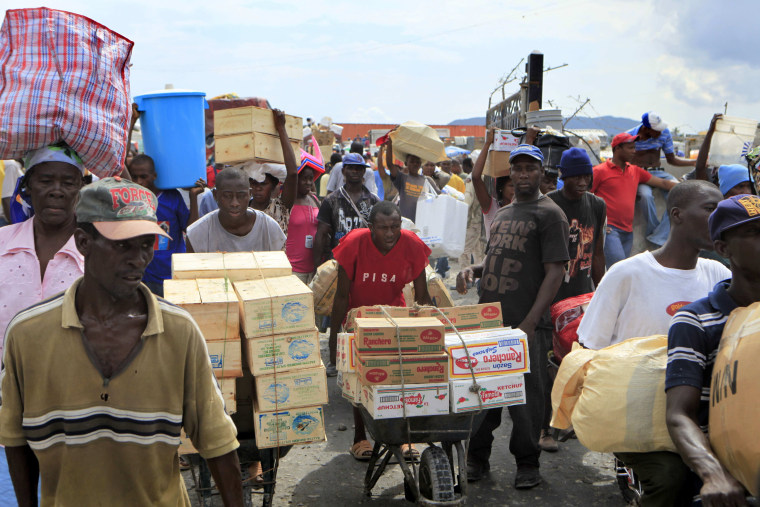After six days of waiting at Haiti's border, Mario Polanco was losing patience with the red tape holding up his truck full of earthquake relief supplies.
Polanco drove the equipment for the International Committee of the Red Cross 11 hours from a port in the Dominican Republic, only to have the Haitian customs agent find one problem after another with his paperwork. As he waited in the shade of his truck's cab in this dusty border town, dozens of others were lined up behind him.
"I don't know why they are making it so difficult on people," Polanco said.
For more than six weeks following the Jan. 12 earthquake, Haiti left its border with the Dominican Republic open to speed the delivery of aid. As the government now reasserts control, the return of bureaucracy is leading to delays as trucks idle for days.
One day this week at the customs office at Malpasse, the Haitian town across from Jimani, a single agent was processing a caravan of trucks, including Polanco's, that stretched for miles. In the line were rice, beans, canned food, construction materials and ambulances — all desperately needed in Haiti.
"We haven't been able to distribute food for two weeks," said Paloma Rivera, an official with Quisqueya in Action, a nonprofit Dominican organization that is feeding some of Haiti's homeless quake victims.
Haitian Prime Minister Jean-Max Bellerive says border controls are necessary to intercept contraband, and also raise revenues from commercial drivers' import fees.
"Some kind of control is needed," said Bellerive, who added that delays were to be expected. "There is a lot of traffic across a border that was not prepared for that."
'Everyday it's something different'
The main southern road between the two countries that share the Caribbean island of Hispaniola became a major thruway for humanitarian aid following the magnitude-7 quake, which killed a government-estimated 230,000 people and left more than 1 million people homeless.
The road was particularly important in the first weeks of the crisis as the Port-au-Prince airport, which has only one runway, diverted aid flights to Santo Domingo amid a crush of emergency traffic. The U.N.'s World Food Program is also now rushing to build up Haiti's sea ports ahead of hurricane season, when heavy rains often wash out mountain roads.
Some say an alternative route cannot come soon enough.
Polanco, who works for a Dominican company contracted by the Red Cross, was transporting heavy-lifting equipment. Other trucks in the convoy carried portable toilets and wood and cement for reconstruction. He said a Red Cross representative was coming to the border each day to help, but the customs agent kept finding new problems.
"Everyday it's something different," he said. "Now the number on the truck doesn't match with the papers."
The overwhelmed agent ignored a reporter's questions as he fielded demands from drivers packed inside his office.
Haiti's bureaucracy was famously sluggish even before the earthquake shattered government agencies. Businesses could wait months for supplies from the U.S. to clear customs at seaports.
Corruption was also a problem. Haiti regularly ranks among the worst in Transparency International's annual ranking of perceived corruption. Haiti ranked 168th out of 180 countries in 2009 on a scale where low scores mean most corruption.
Restrictions
Aid delivery by the U.S. Agency for International Development has not been affected by the recent backups at the border, according to Kimberly Flowers, an agency spokeswoman in Port-au-Prince. She said most of its supplies arrive by sea, and USAID has its own customs and leasing agents to expedite material coming over land.
But the checks that Haiti put back in place on March 3 have affected agencies as large as the World Food Program, which has agents stationed on both sides of the border and has sent more than 800 trucks through Jimani.
Several WFP trucks have been delayed by a requirement imposed this week for all paperwork to be scanned and sent via e-mail from Santo Domingo to Port-au-Prince, according to Elder Reyes, a WFP logistics specialist.
The adjustment to the back-to-normal restrictions has been hardest on some of the smaller aid groups. Some groups stalled at the border have distributed aid meant for the capital to the poor in Jimani, said Roselio Diaz, who works for a local food pantry.
Despite the headaches, some groups say it is not as efficient to send humanitarian aid by sea.
"Trucking is more effective since we can ship to various locations," Save the Children spokeswoman Kate Conradt said.
At the border, drivers without other options have had luck with bribery.
Customs agents have been arbitrarily charging trucks $40 for entry, Reyes said. He said agents threaten to demand passports or visas that many drivers do not have.
One driver, Jose Lorenzo, was held up for four days before he was allowed to cross the border with a load of canned tuna for the SOS Children's Villages organization.
When the Haitian agent demanded that he present a passport, Lorenzo said: "Here is my visa," and handed over 150 Dominican pesos — about $5. He said the agent let him pass without further hassle.
